The biggest sitting Buddha and the Cloister of Fuhu
(For German please klick here!)
A three hours bus drive brings our group from Chengdu to Leshan in the Chinese province of Sichuan.
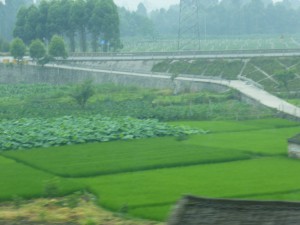
The weather is not the best, it is quite misty outside but very warm. We drive past tea plantations, rice fields and lots of fruits growing areas. The province of Sichuan is very green and fertile. It never freezes here in the lower regions.
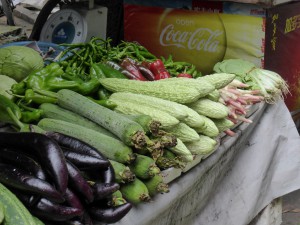
Arriving in Leshan we decent the bus at the river. Leshan is situated at the junction of the three rivers Min Jiang, Dadu und Qingyi. First of all we need a “harmony break”, that means we need to get our bodies back into harmony, short form for “where is the next toilet”? On our way to “harmony”, we cross over a local market, where we see lots of unknown fruit and vegetables.
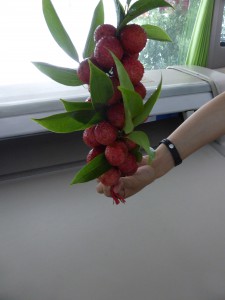
Back at the river we are boarding a relatively small vessel. It doesn´t start before we all wear a proper life vest.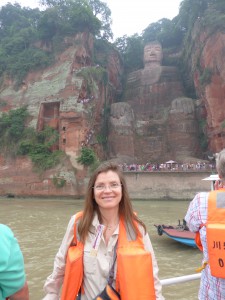
In the 8th century, people built the biggest sitting Buddha out of the red stone at the junction of the three rivers. These are the Min Jiang, Dadu and Qingyi. He should ensure a safe navigation for all ships on the rivers.
After only some minutes we are cruising in front of the Buddha. We are lucky that we can see it, because due to the weather conditions here it is often not visible. Too much mist or rain. (For a short video go this way.)
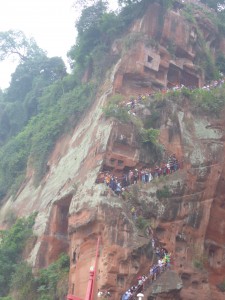
It is possible to walk to the figure, but you have to decent a very steep staircase and you can´t see the whole statue from there. It is only completely visible from one of these small vessels. At the left and right from the Buddha statue, a lot smaller guardian figures can be seen from the boat. The whole Buddha is about 233 feet (71 m) high.
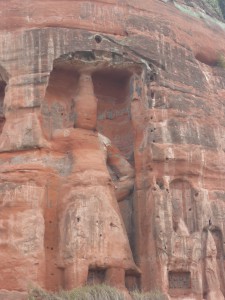
Soon the cruise is over and we drive on to the city of Emeishan, which is situated at the foot of the holy mountain Emeishan that houses quite a few cloisters.
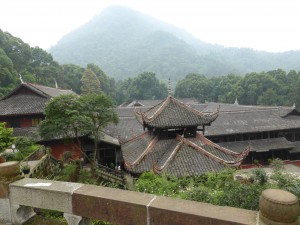
We stop at the nun’s cloister of Fuhu. It is not so widely known and mostly not frequented by tourists. About 60 nuns are still living here. The origQinginal buildings were mostly destroyed in the Cultural Revolution. Only a small pavilion was saved from the vandalism. They rebuilt the cloister true to original.
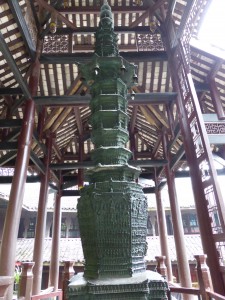
A visit is not only worthwhile because of the beautiful architecture but also because of the quietness that surrounds you there. Here you can forget about the noise of the city.
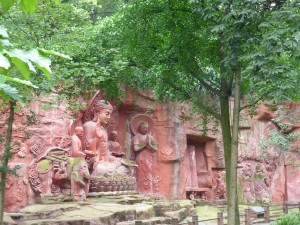
We quickly check into our hotel, the Sunrise Emeishan Hotel. We are really hungry. Dinner in the “Teddy Bear” restaurant is delicious like always (only breakfast we have to get used to, it´s very different with all that rice, soup and vegetables).
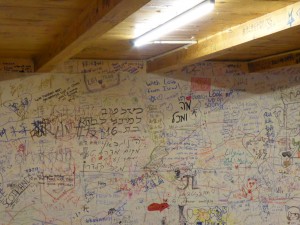
Our Chinese guide, Ms. Ling shows us some more of the Chines style of living. She goes with us to a big public park, where mostly retired people spend the evening with “Grandpa and Grandma dancing”. I can´t describe it, just watch and listen here. (Sorry, the quality could be better, I know…)
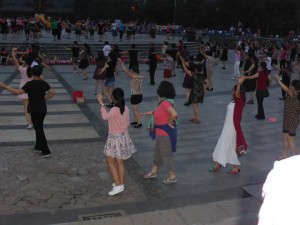
Grandpa-Grandma-Dance
You would like to get some more information about (my) travelling? Just “like” my site on facebook, this way please.
[…] (For English press here!) […]